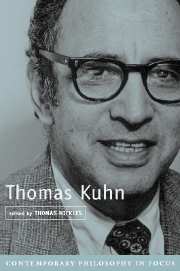Book contents
- Frontmatter
- Contents
- Contributors
- Preface
- Introduction
- 1 Kuhn and Logical Empiricism
- 2 Thomas Kuhn and French Philosophy of Science
- 3 Normal Science and Dogmatism, Paradigms and Progress: Kuhn ‘versus’ Popper and Lakatos
- 4 Kuhn's Philosophy of Scientific Practice
- 5 Thomas Kuhn and the Problem of Social Order in Science
- 6 Normal Science: From Logic to Case-Based and Model-Based Reasoning
- 7 Kuhn, Conceptual Change, and Cognitive Science
- 8 Kuhn on Concepts and Categorization
- 9 Kuhn's World Changes
- 10 Does The Structure of Scientific Revolutions Permit a Feminist Revolution in Science?
- Selected References in English
- Index
- References
Introduction
Published online by Cambridge University Press: 07 December 2009
- Frontmatter
- Contents
- Contributors
- Preface
- Introduction
- 1 Kuhn and Logical Empiricism
- 2 Thomas Kuhn and French Philosophy of Science
- 3 Normal Science and Dogmatism, Paradigms and Progress: Kuhn ‘versus’ Popper and Lakatos
- 4 Kuhn's Philosophy of Scientific Practice
- 5 Thomas Kuhn and the Problem of Social Order in Science
- 6 Normal Science: From Logic to Case-Based and Model-Based Reasoning
- 7 Kuhn, Conceptual Change, and Cognitive Science
- 8 Kuhn on Concepts and Categorization
- 9 Kuhn's World Changes
- 10 Does The Structure of Scientific Revolutions Permit a Feminist Revolution in Science?
- Selected References in English
- Index
- References
Summary
Whether one is pro-Kuhn, anti-Kuhn, or neutral, no one can deny that the work of Thomas Kuhn has been a lightning rod for debates about science, culture, and policy across many academic fields – and even in the political arena and the business world. This is especially true of Kuhn's best-known work, The Structure of Scientific Revolutions, originally published in 1962 and expanded in 1970. By now the book has sold over a million copies in two dozen languages – numbers almost unheard of for an academic book about abstract philosophical topics. The wide reception of his work, which greatly surprised Kuhn himself, has elevated the terms “paradigm,” “paradigm change,” and “paradigm shift” to household phrases and the stuff of advertising slogans, corporate boardrooms, and Washington bureaucratese. Although diverse individuals and groups have read and used (or misused!) it very differently, each according to their own abilities and needs, Kuhn's work has the merit, in these fragmented times, of serving as a common reference point and of generating cross-disciplinary discussion.
When Kuhn began writing, philosophy of science, especially in England and the United States, was dominated by the logical positivists (Rudolf Carnap, Hans Reichenbach, Carl Hempel, and others) and by Karl Popper and his followers. In The Structure of Scientific Revolutions (Structure hereafter), Kuhn gave us a very different picture of science. Kuhn contended that there are two types of mature physical science, “normal science” and “extraordinary” or “revolutionary science.
- Type
- Chapter
- Information
- Thomas Kuhn , pp. 1 - 18Publisher: Cambridge University PressPrint publication year: 2002
References
- 2
- Cited by

